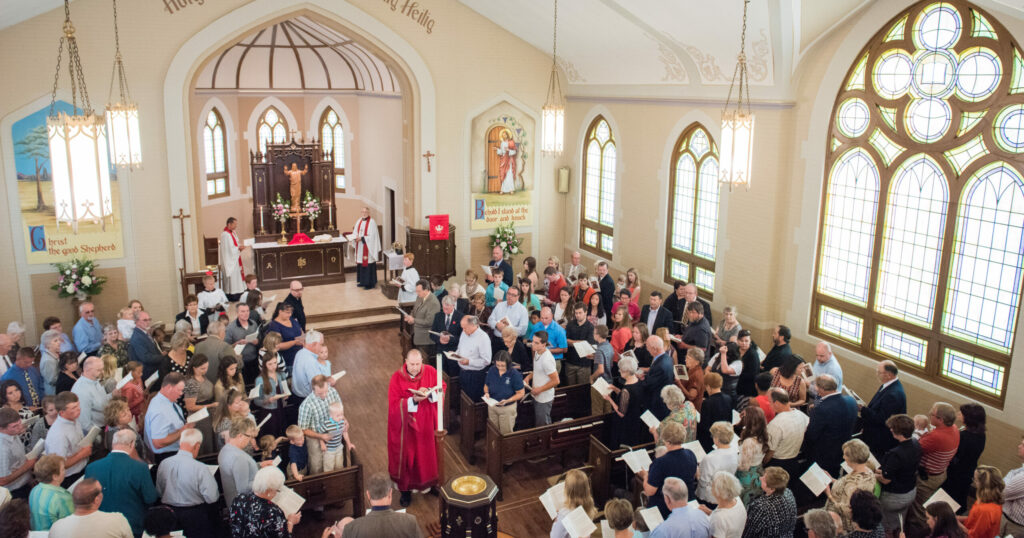By Phillip Magness
The first installment of this series discussed the difference between communities formed by people coming together to do sundry things and the worshiping community, which is formed not by human will, but by the Holy Spirit as the Lord gathers His people to receive His gifts in the Divine Service. The second installment outlined how worship forms and nurtures the faithful into a community that is alien to the world. This, the final installment, will review why worship is incomplete without you even as worship is first and foremost the Lord’s work.
You may have heard the phrase that Christians are “in the world, but not of it,” drawn from Jesus’ High Priestly Prayer (John 17:14–15). Similarly, in his letter to the Romans, St. Paul entreats, “Do not be conformed to this world, but be transformed by the renewal of your mind” (Rom. 12:2a). Our participation in the worshiping community is a participation in the Holy Spirit’s work of gathering and sanctifying the church. The act of worship requires worshipers.
Indeed, Luther’s Small Catechism teaches us that the Holy Spirit “calls, gathers, enlightens, and sanctifies the whole Christian Church on earth, and keeps it with Jesus Christ in the one true faith” (emphasis added). No Christian is excluded from the Spirit’s holy work. There is no special dispensation by which some Christians are edified into the people God intends in some manner apart from the Word through which the Holy Spirit works. There is no holy communion out in nature; the Lord’s Supper is not found on the fields of traveling soccer; the fellowship of believers is not located in the newsfeeds on our computer screens. Those who are part of the Body of Christ are missed when they are not there. They are missed by their fellow believers, for sure; more important, they are missed by God.
This is why pastors make such an effort to bring Holy Communion to the sick and the shut-in. There are times when we legitimately can’t make it to church; at such times, the care of souls entails bringing the Spiritual blessings of the Divine Service to those unable to attend. We, the Body of Christ, care for them just as our Lord cares for them. God does not want anyone left out.
Consider the Parable of the Lost Sheep (Matt. 18:10–14). Here the Lord points out how the shepherd, for a time, leaves 99 sheep behind so as to recover one that is lost. He does this to illustrate the steadfast love of God in seeking and saving the lost. While this parable is about repentance and faith and may not seem to say much about sanctification in worship, we do well to remember two things here: first, sanctification flows from justification (hence the need to daily remember our Baptism and continually confess our sins); second, the shepherd keeps the other 99 in the flock. God doesn’t go after the lost while losing the saved. Similarly, worship builds up the whole body of believers as Jesus desires to be with both the one and the 99.
So God doesn’t only call you into the Divine Service and then sanctify you by His Spirit when you come. He also simply wants you to be there because He loves you. He knew you in your mother’s womb (Psalm 139:13) and chose you before the world was even formed (Eph. 1:4). He made you to be part of His Body, the Church, and so we both rejoice and suffer together (1 Cor. 12:25–27). Thus we do not give up meeting together, “as is the habit of some” (Heb. 10:25), but encourage one another in faith as the Lord uses us to build His kingdom and as we look forward to the Last Day, when in the New Heaven and the New Earth all will be gathered in.
When we sing the Lord’s song, our neighbors hear His voice. When we confess our sins, our fellow worshipers know they are not alone in their fallen condition. When we speak the creeds, each one of us can take heart that we do not run the race alone. When we put our offerings in the plate, we are reminded that the Lord has entrusted to our congregations the work of His ministry. When we commune together, we manifest the unity that has been created for us in Christ Jesus. And when we give one another a smile, we reflect the countenance of the Lord who blesses us as He looks upon us with favor and grants us His peace.
What we do in worship is God-pleasing, but its purpose is not to please God. God does not need us to be in church. He does not need to be entertained or to have His ego built up, nor does He require our sacrifices (Psalms 40:6; 50:2–4, 8–12).
What He desires instead is for you to be in worship so that He can bless you and you can be a blessing to others. He wants all the sheep to be in His pen. Worship is incomplete without you.




I would have enjoyed the prior 1&2 reading if were available. This #3 was very enjoyable . JimmieL
Here you go!
Part 1
https://witness.lcms.org/2024/worship-reveals-a-community-created-by-the-holy-spirit/
Part 2
https://witness.lcms.org/2024/worship-nurtures-a-community-that-is-alien-to-this-world/
Well stated, dear friend!